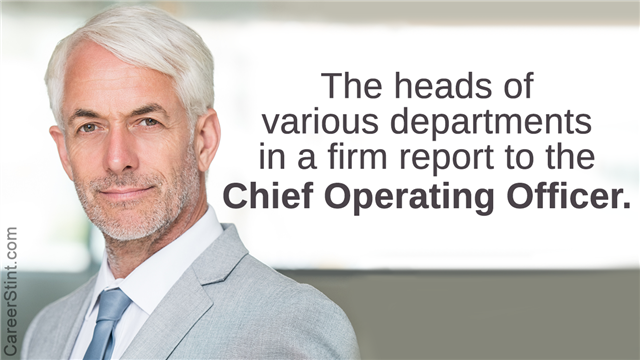
Tap to Read ➤
Detailed Job Description of a COO
Kundan Pandey


The job of a Chief Operating Officer or Chief Operations Officer (COO) is not only estimable, but also very lucrative. It is one of the top executive, decision-making positions in an organization. This article will give you detailed information about the role and responsibilities of a COO.

Given the diversification of various business enterprises, the need for effective management and leaders has gained absolute importance. In various corporates and businesses, besides the Chief Executive Officer (CEO), there are other high managerial level positions that look after various functions of an organization. While the job of a CEO entails activities that are mainly concerned with monitoring overall functioning of the firms, a COO is the one who act as a catalyst in getting the daily operations of a firm done effectively and within the stipulated time.
Job Description

The Chief Operating Officer assists the CEO in routine work and looks after the optimization of various operations in different departments of the firm.

Be it information technology, marketing, sales, customer service, account management, etc., the job of a COO entails activities pertaining to monitoring the working of each of these departments.

If you observe the working of COOs in top corporate firms, you'll find that they report to CEOs while the heads of various departments, in turn, report to the COOs. A very basic fact associated with COO jobs is that their duties differ depending on the size of the enterprise.

Duties and Responsibilities

Some of the most important duties of this profession include the following:
Communicating and Informing

A COO calls a meeting of all the department heads to discuss the Annual Operating Plan. It includes details of projected results, strategies to achieve them, deadlines, risks, budgets, resources, etc.

Monitoring
A COO has to monitor the performance of each operational unit through the performance reporting system and take corrective actions wherever necessary.

Assessment
A COO has to assess the progress made by each operating unit to ensure that they are all working towards achieving a common goal for the organization.

Consultation
He has to give suggestions and advise management for undertaking key changes in the planning of pivotal business strategies and decisions.
Resource Management
A COO has to undertake the responsibility of optimal allocation of resources to redeem maximum value for the organization.
Planning

Strategic planning to achieve the organization's objectives is the main component of this job. He also plans the activities of various departments and discusses them with the respective heads.

Budget Development
A COO has to develop a financial budget by considering the short-term and long-term goals of the organization.

Business Development
He has to attend crucial meetings, participate in road shows, contribute in the acquisition and takeover activities, etc. that generate growth opportunities for the business. Also, he has to participate in capital market development activities.
Execution

Apart from strategic planning, a COO has to successfully execute various activities and strategies to meet the goals of the organization. He should have a result-oriented approach while implementing innovative ideas.

Supporting Policies
He has to develop, improve, and direct strategies to support and promote the policies and objectives of the organization.

Process Management
He has to mentor the inception and incubation of a groundbreaking process, its enhancement and successful implementation.

Quality Management
A COO has to keep a close watch on the quality control of various activities with regards to product manufacturing, spares, services, packaging, sales, tasks, etc.

Convening Meetings
He has to conduct regular meetings and sessions with all department heads to ensure that tasks are completed as per the priorities.

Abiding by Laws and Rules
He has to ensure that all the activities comply with legal regulations, ethics and policies regarding general duties and management.

Peacemaker
A COO has to act as a mediator for conflict resolution among various departments. If there is any problem between two or more departments, the COO has to intervene and resolve the issues for smooth operations and effective coordination.

Target Setter
He has to set and assign operational goals for all departments from time to time to realize the annual targets. He should also reward each department as a team after the targets are achieved.
Team Work

He has to demonstrate competence in handling team building activities and motivating the teams to give qualitatively superior performance.

Troubleshooting
In case of a crisis or problem, he has to play the role of the leader and steer the organization towards success.

Interaction
A COO has to interact with the senior management like the CEO and board of directors. He has to ensure that their instructions regarding the operations of the company are executed. Also, he has to suggest changes and recommend strategies in the interest of the organization.

Recruitment
A COO also looks after the requirement of manpower and designs recruitment strategies accordingly. Also, he has to ensure that the employees and customers are satisfied.

Qualities and Skill Sets
- Prioritizing
- Communication Skills
- Management Skills
- Interpersonal Skills
- Analytical Skills
- Leadership Qualities
- Public Speaking
- Team Player
- Organization Skills
- Trustworthy
- Negotiation Skills
- Committed to Excellence

- Mediating Skills
- Knowledge About Budgeting
- Presentation Skills
- Time Management Skills
- Business Development Skills
- Project Management
- Proactive
- Change Management
- Multitasking Skills
- Planning and Execution Skills
- Intelligence
- Innovation

Average Salary
If you analyze various salary ranges for managerial jobs, you'll find that a COO's salary is one of the highest among the senior management positions. The average salary for the COO position ranges between $239,238 to $704,349. The median salary of a COO is considered to be around $447,893 .

The salary for a COO position is directly proportional to the years of experience and specific expertise in a certain domain.
Being the COO of a firm is definitely a responsible position and indirectly the performance of a firm depends on the efficiency of such managers.
Being the COO of a firm is definitely a responsible position and indirectly the performance of a firm depends on the efficiency of such managers.

To become a COO, one has to be armed with a good management degree (either bachelor's or master's) and must have a seasoned work experience. Since COO is one of the top positions in a firm, one must make it a point to get relevant work experience in the field of management.

A COO is a senior position and you can definitely demand a higher salary according to the level of your expertise and experience. You can also ask for a salary package that will award you some stock options of your organization. Career opportunities in the dynamic domain of management have increased tremendously in the last decade and simultaneously, the field has also grown fiercely competitive. Hence, if you are equipped with the right degree, experience, and skill sets, you can steadily climb the ladder of success and become a good COO.